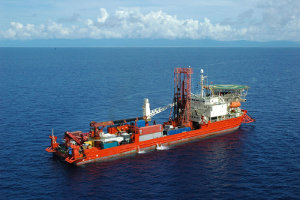 A four-year regional Deep Sea Minerals (DSM) Project has been designed to address the policy and law requirements of Pacific Island Countries. This is in relation to the potential mineral wealth on the seabed within their respective country’s waters.
A four-year regional Deep Sea Minerals (DSM) Project has been designed to address the policy and law requirements of Pacific Island Countries. This is in relation to the potential mineral wealth on the seabed within their respective country’s waters.
This project will make a major contribution towards the sustainable management of deep-sea mining in the Pacific Islands Region. Deep-sea mining is expected to commence in the Bismarck Sea in Papua New Guinea within the next 3years that underscores the importance of having policy and law requirements in place.
Once implemented, they will provide effective environmental, financial and social management controls for the exploration and exploitation of deep-sea minerals. Mr. Akuila Tawake, Aggregate Geologist at SOPAC, a division of the Secretariat of the Pacific Community (SPC) who was recently appointed as Team Leader of the Deep Sea Mineral (DSM) Project said, that based on the results of previous studies, a number of these island countries have “promising” seabed mineral potential.
He listed the major marine mineral deposits into three groups: SMS (Seafloor Massive Sulphides), Cobalt-rich Crusts, and Manganese Nodules.
SMS deposits include high-grade copper, with significant enrichment in gold, silver, zinc and lead. These can usually be found at depths from 350 metres to 5,000 metres.
Cobalt-rich crusts include cobalt, nickel and platinum and range in depths from 400 to 4,000 metres.
The last is the manganese nodules found on the ocean floor at depths ranging from 4,000 to 6,000 metres. They are a composite of manganese, iron, cobalt, nickel and copper.
He said that the Deep Sea Minerals Project would have four main components:
1. To develop a regional framework for the management of minerals that occur on the seabed and offshore mining;
2. To use the regional framework to formulate national offshore minerals policy and laws;
3. To strengthen capacity through training and active participation of island countries citizens in the searching and mining of offshore minerals;
4. To formulate environmental management guidelines and ensure best practice in environmental monitoring.
Funded by the European Union, the Deep Sea Minerals Project will be implemented in the following fifteen island countries: Cook Islands, Federated States of Micronesia, East Timor, Fiji, Kiribati, Marshall Islands, Nauru, Niue, Palau, Papua New Guinea, Samoa, Solomon Islands, Tonga, Tuvalu and Vanuatu.
It is expected to hold its first regional workshop in Nadi Fiji in May 2011.
